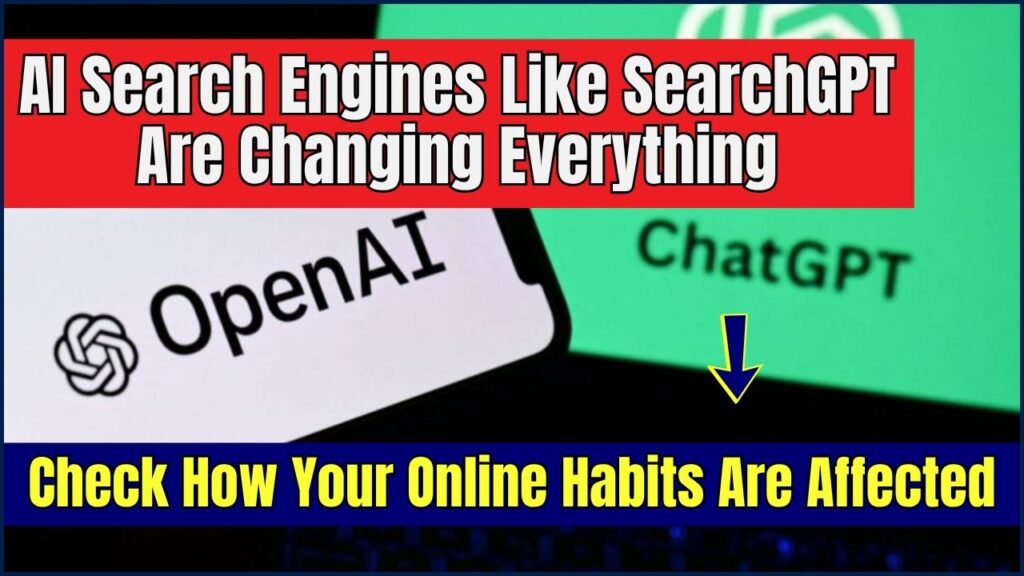SearchGPT Are Changing Everything: Artificial intelligence is flipping the script on how we explore the web. AI search engines like SearchGPT, Perplexity, and ChatGPT are dramatically reshaping everything we thought we knew about search. Gone are the days when typing a few keywords and hitting enter was the only way to find answers. Now, you can literally talk to a search engine like you’re chatting with a smart friend who knows everything on the internet.

This new wave of tech isn’t just changing how you look for info. It’s completely reprogramming how you interact with content, absorb knowledge, make decisions, and even trust online sources. Whether you’re a student cramming for finals, a professional hunting for market trends, or just someone curious about the best pizza joint nearby – your digital behavior is going through a major upgrade.
SearchGPT Are Changing Everything
| Feature | Details |
|---|---|
| Technology | AI Search Engines (SearchGPT, ChatGPT, Perplexity) |
| Impact | Reduces traditional keyword-based browsing, delivers direct conversational answers |
| Behavior Change | Fewer clicks, faster info, deeper engagement, more trust in AI-generated content |
| SEO Shift | Rise of Generative Engine Optimization (GEO) and Answer Engine Optimization (AEO) |
| Official Resources | OpenAI, The Verge, WSJ |
AI search engines like SearchGPT are redefining the internet experience. They’re faster, smarter, and way more interactive. From boosting productivity to rewriting digital marketing rules, this isn’t just an upgrade—it’s a whole new OS for how we use the web.
Users need to stay savvy, businesses must evolve, and everyone should lean into digital literacy. Because the shift isn’t coming. It’s already here.
What Is an AI Search Engine Like SearchGPT?
SearchGPT and similar tools are AI-powered search engines built on large language models (LLMs) like GPT-4 or Claude. These systems understand your questions in natural language and serve you up clear, concise, and relevant answers. Instead of just sending you to a bunch of blue links (like Google), they digest the web for you and deliver conversational summaries.
Imagine asking, “What’s a good SUV for city driving and occasional camping?” Instead of hopping between a dozen websites, AI search drops a straight-up answer with options tailored to your needs—and often includes links, specs, and pricing too. It’s like search meets assistant meets personal researcher.
These tools don’t just work on web browsers. You’ll find them integrated into mobile apps, voice assistants, and even productivity tools like Slack and Microsoft Teams. They’re changing the playing field across industries.
How Your Online Habits Are Getting a Makeover
From Keywords to Conversations
We used to play a guessing game with search engines. Use the wrong word, and boom—you’re lost in irrelevant results. Now, AI tools like ChatGPT and SearchGPT understand full sentences, idioms, and intent. You can ask a question the way you’d ask your buddy at lunch. And that changes everything.
Whether you’re typing “How do I reduce credit card interest legally?” or “Why’s my cat meowing at 3am every night?”—AI gets you.
Fewer Clicks, Faster Info
According to Arxiv research, users who rely on AI search complete their tasks up to 30% faster than those using traditional search engines. Instead of clicking on link after link, you get distilled, actionable answers.
You save time, avoid spammy sites, and still get the option to dive deeper if needed. It’s productivity gold.
Shopping and Recommendations Just Got Smarter
More than 42% of online shoppers already use generative AI for buying decisions, per WSJ. You want a new coffee maker? Just ask. AI will tell you the top-rated ones, compare prices, mention pros and cons, and even show you YouTube reviews if relevant.
It’s like having a deal hunter, product analyst, and reviewer all in one. Expect this to explode in coming years.
The Decline of Traditional Search
Google has long been the gateway to the web. But now? Even Safari’s built-in Google usage has dropped for the first time in two decades. According to The Verge, this shift is being driven by AI-native experiences.
Apple execs testified in legal proceedings that users prefer direct, intelligent answers over digging through links. Google is trying to catch up with its own AI integrations, but it’s not leading anymore—it’s reacting.
The future is about intelligent answers, not pages of results. That’s a paradigm shift.
New Rules for Businesses: Welcome to GEO and AEO
Marketers are facing a brand-new playbook. Gone are the days of stuffing keywords and chasing backlinks. AI doesn’t care about keyword density. It cares about context, clarity, and user intent.
Enter Generative Engine Optimization (GEO) and Answer Engine Optimization (AEO). These are about crafting content that AI models find useful enough to pull into their responses.
So:
- Write content that answers questions in plain language.
- Use headers and structure to guide LLMs.
- Include facts, stats, and examples that AI can cite.
- Keep it real, helpful, and snappy.
Bloggers, business owners, and journalists all need to shift mindset from search visibility to answer visibility.
Real-World Examples of Changed Behavior
Students
Students are using AI like it’s a digital tutor. Whether they’re learning trigonometry or U.S. history, SearchGPT can explain in simple terms, provide visual breakdowns, and even create quizzes. And yep, AI can cite sources too.
Professionals
Consultants, engineers, and startup teams use AI for real-time insights. They ask about market trends, legal precedents, and coding fixes. It’s faster than Googling and more nuanced than forums.
Creators
Bloggers, YouTubers, and podcasters brainstorm topics with AI, generate outlines, and even double-check facts. It’s part research assistant, part co-writer.
Parents and General Users
People ask AI everything—from how to clean a dishwasher to what symptoms match a kid’s fever. It’s like Google meets Mayo Clinic meets Pinterest.
Risks You Gotta Know
Let’s be real: AI isn’t flawless.
Bias and Influence
If you’re asking AI for product recommendations, news opinions, or political commentary, watch out for bias. Even the smartest models reflect the data they’re trained on. If that data leans one way, so will your answer.
Arxiv studies show how AI subtly steers decisions. That makes transparency and model accountability more important than ever.
Accuracy
Sometimes, AI makes stuff up. It’s called “hallucination.” You might get outdated facts or misinterpreted data. Always cross-check with credible sources before making big decisions.
Privacy
AI gets smarter the more it knows about you. That means your queries—especially personal or sensitive ones—could be logged. Make sure you’re using platforms with strong privacy policies, and avoid oversharing.
How to Use AI Search Engines Smartly
1. Ask Conversational Questions
Frame your question like a conversation. It gives better context to the model. Try “What are some easy home workouts for people over 40?” instead of “home workout over 40.”
2. Follow Up
Dig deeper. Ask “Why that one?” or “Any cheaper alternatives?” The real power is in the dialogue.
3. Validate with Trusted Sources
Always check for citations. If it doesn’t show links, ask for them: “Can you cite a .gov or .edu source?”
4. Mind the Gaps
AI is learning—but it’s not perfect. Keep a healthy skepticism. If something sounds too good, check it.
Frequently Asked Questions On SearchGPT Are Changing Everything
Q1. What is SearchGPT and how is it different from Google?
SearchGPT is an AI-driven search engine that provides full, conversational answers instead of listing search results. It’s smarter, more intuitive, and often faster.
Q2. Is AI search safe to use?
It’s generally safe, but you should still check facts, understand data usage policies, and remain alert to subtle biases.
Q3. How can businesses optimize for AI search engines?
Adopt Generative Engine Optimization strategies: clear writing, context-driven headlines, and structured content.
Q4. Will AI search replace traditional engines?
Not immediately. But AI tools will likely become the first stop for a growing number of users.
Q5. Can AI search work well on smartphones?
Totally. Most AI search engines are mobile-ready, and some even integrate voice search and chat-based UIs.











